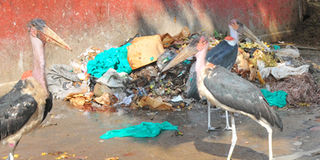Prime
Embrace garbage collection as a collective responsibility

A garbage heap in Kampala. Garbage should not be left to accumulate at any place. Photo by Faiswal Kasirye.
What you need to know:
Do you know how much garbage or waste your own hands create around you? Right from that little tiny chewing gum wrap, to having to do away with your old and non-functional printer at home. And have you ever wondered where all this garbage ends up?
Amidst all the advancement in the world today, the amount of disposable items is rising at an alarming speed. On the other, the mechanisms of disposing off this massive refuse in a proper way is still lacking. Add this to the lack of proper waste management sensitisation.
Gone are the days when the milk man delivered fresh milk in containers while picking that one used the previous day. Packaging companies are now competing to produce more attractive packaging materials, very eye-catching, but unfriendly to the environment.
One day, while in a mall somewhere in the Arab world, I was getting in the car when I heard noise. It sounded like a can being dropped on the floor. I looked to the direction of the noise and there, a man who had just finished a meal had thrown the plastic food containers and his drink can right next to a car and walked away. Although I have repeatedly seen such an act, what bothered me more was that this man was in police uniform.
Providing solutions
To keep the environment clean and litter-free, is everyone’s responsibility but to see a guardian of law and order breaking such a simple but fundamental regulation is very sad indeed.
I have written before about the issue of recycling and how advanced some European countries are when it comes to proper waste management. For example, in my country Luxembourg, for some reason, most of the people living there seem to have finally understood the importance of recycling to keep the environment safe and pollution-free.
In that country, taxes that are taken from people are used properly. It is all invested in infrastructure and services that not only benefit the communities today, but also protect and safeguard it for future generations. There are at least three different waste collection trucks that pass by homes every week. Every family has also specific containers for what is called wet and dry garbage.
There are big blue bags for all kinds of plastic material, and to add to that, there are small corners in each town where big garbage bins are placed, each properly demarcated for paper, glass, metallic items as well as organic matter.
As if this was not enough, there is a place in between every two to three towns called the “Super garbage bin” it is like a small city where people take larger items that they have nowhere else to put.
In a country like Greece where people seem to need more incentives to properly dispose of garbage, I have seen the same recycling bins but with openings that count the number of recyclable items thrown in, then one is given a credit through a receipt that can be redeemed in supermarkets. This apparently has helped some needy people to collect other people’s garbage and by throwing it in the bin, they get more credit for shopping.
Talking about other people’s garbage, few can compete with the Indians in India who have learnt how to make money out of every garbage bin in town. The government’s efforts in sensitising people, especially the domestic helps, on how to segregate garbage has worked. People collect the recyclable material and sell it per kilo for an extra income.
As every thing is getting electronic, we now hear of E-waste recycling, which has to do with companies which pick your unused electronic goods for free and even offer some cash for it. Now, where are we in all this in Uganda? Over to you for an answer.




